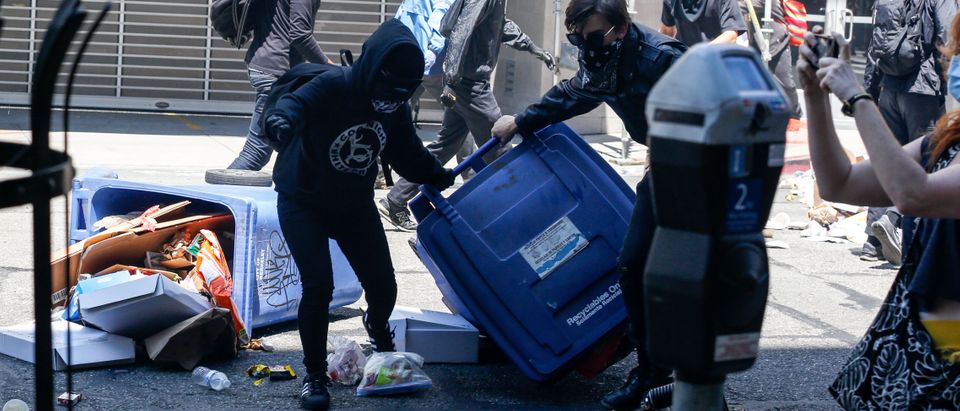In his speech at the Conservative Political Action Conference (CPAC) on Saturday, President Trump announced his plan to sign an executive order that would revoke federal funding from any university which does not respect the free speech rights of its students.
As a recent graduate of UC Berkeley and the former Vice President of the Berkeley College Republicans, I agree that such an executive order is necessary. During my time at UC Berkeley, I experienced firsthand the severity of the campus free speech crisis and the reluctance of campus administrators to take appropriate steps to deal with the problem.
Take, for instance, the riot which occurred at Berkeley on Feb. 1, 2017. After the rioters managed to shut down a conservative speech that was to be given that night, mobs of self-proclaimed fascists chased the Berkeley College Republicans through the streets. They later set fire to the campus and destroyed downtown Berkeley.
UC Berkeley predictably responded to this by implementing an unwritten speech policy that placed numerous unconstitutionally burdensome time, place, and manner restrictions on so-called “high-profile speakers” without consulting the Berkeley College Republicans or the community at large. The primary consequence of this new policy was that unpopular (i.e. conservative) speakers had a far more difficult time speaking successfully on campus than liberal speakers, whose views are identical to Berkeley’s progressive majority.
When we tried to host conservative commentator and UC Berkeley alumnus David Horowitz in March 2017, the administration and campus police forced us to hold our event a mile from campus during a time of day when many students were in class, told us not to publicize our event, and then imposed a $6,000 “fee,” also known as a speech tax, on the event. These unwarranted restrictions forced us to cancel the event.
Soon after, when we tried to host conservative commentator Ann Coulter to represent the conservative perspective for an immigration speaker series, the university refused to provide us a venue and eventually cancelled the event, citing unspecified “security concerns.” The university, however, allowed an event with former Mexican President Vicente Fox — well-known for holding a liberal position on immigration — to take place within a few days of our planned event with Coulter, closer to campus and during a time when students could easily attend.
Finally, in September 2017, a conservative was allowed to speak at Berkeley. This event with Ben Shapiro, however, required a massive police presence, the total cost of which was over $600,000. Perhaps if the university had been more proactive in demonstrating a commitment to free speech earlier on, such a costly show of force might not have been necessary, saving California taxpayers money better spent elsewhere.
By this point, it had become clear that the university was unfairly applying its time, place, and manner restrictions to conservative events, so the Berkeley College Republicans filed a lawsuit against UC Berkeley. Our lawsuit was eventually successful in getting the university to rescind in its speech policy in December 2018, and pay substantial attorney fees to the plaintiffs, the Berkeley College Republicans and Young America’s Foundation.
Yet even though this battle had been won, the greater war for free speech on campus is far from over. Only two weeks ago, conservative youth activist Hayden Williams was assaulted on campus at Berkeley while helping to train students in free speech activism. While the attacker has since been arrested, this incident should be enough to disabuse anyone of the notion that campus free speech issues are no longer relevant.
In light of these numerous incidents of censorship at Berkeley, and the campus administration’s patchy record of responding to such incidents, it is highly appropriate for the president of the United States to issue an executive order denying federal funding to universities that do not protect the fundamental free speech rights of students. On the contrary, it is the best means of assuring accountability on the issue of campus free speech.
Indeed, if the president has sworn a solemn oath to “preserve, protect and defend the Constitution of the United States,” then it is difficult to imagine anything more in keeping with the letter or spirit of this oath than an executive order preserving the First Amendment on campus where their abrogation has the most fundamental impact on our society long-term.
What occurred at Berkeley is occurring at universities across America. It is a deeply-concerning situation when protestors think that they can assault students with impunity on the basis of political disagreement, regardless of whether or not university administrators condemn or condone their behavior. Should Trump’s executive order go into effect, universities will find themselves with an added impetus to protect the First Amendment rights of all their students, conservative and liberal alike.
Naweed Tahmas is a former vice president of the Berkeley College Republicans and is presently a communications professional in Washington, D.C.
The views and opinions expressed in this commentary are those of the author and do not reflect the official position of The Daily Caller.


